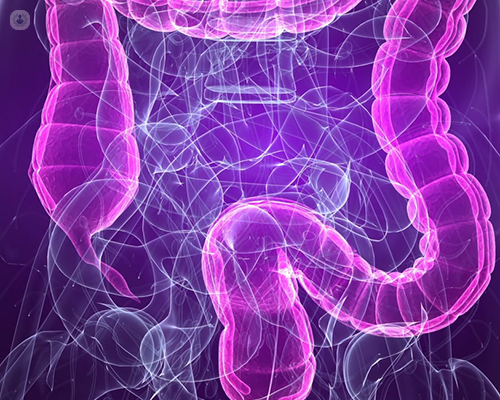How are colon polyps removed?
Written in association with:In this article, Dr Laurence Maiden, a highly revered consultant physician and gastroenterologist, discusses in detail what colon polyps are, and explains how and when they appear.

What are colon polyps?
Polyps are little, fleshy lumps that grow on the inside lining of the colon (large bowel and large intestines). There are many types, but the ones which we are most interested in are adenomas. Adenomas are comprised of glandular tissue and can grow and grow over many years. Over a period of between seven to 10 years, a very small proportion of these adenomas could potentially turn malignant.
Factors that would be considered a greater risk include the size of the polyp when first detected (greater than 10mm) and the appearance of the polyp (finger-like projections called ‘villi’ that pose a greater risk than smooth ‘tubular’ polyps).
How and when do colon polyps appear?
These polyps first appear when the colon cells are dividing, and errors occur as the chromosomes are replicating. The cells continue to divide and are subject to a number of other steps (other genetic mutations and environmental factors) which are all required for the adenoma to grow into a cancer. Environmental factors linked to bowel cancer include smoking, excessive alcohol, obesity and a diet rich in red, processed meat, for example.
Sessile, serrate polyps follow a slightly different pathway to adenomas and are sometimes difficult to differentiate from more common benign hyperplastic polyps. These hyperplastic polyps are common and harmless and usually left alone. However, we now take tissue samples of these polyps if there are more than five of these in the colon (excluding the rectum) and they are more than 5mm in size, or if there are more than 20 of any size.
How serious can they become if they are left untreated?
Very small tubular adenomas (less than 5mm) are very low risk, but there is a risk that they could continue to grow over a period of seven to 10 years into a cancer. Generally, there is a five per cent risk of this. Furthermore, a villous adenoma may pose a 40 per cent risk of developing into a cancer, but these types of adenomas are less common than tubular adenomas. All of these polyps (adenomas) can cause symptoms such as a change in bowel habits (usually looser) or bleeding.
How are polyps detected and removed?
Polyps may be detected and removed during a colonoscopy.
Might colon polyps indicate any underlying conditions?
No. Polyps are not caused by other underlying conditions, but diabetes and obesity may be risk factors that increase the risk of polyps.
As polyps don’t always cause symptoms, we can test faeces (stools) for microscopic traces of blood with a quantitative Faecal Immunochemical Test (qFIT). This is now a routine test sent to everyone in the UK over the age of 54 years old as part of the National Bowel Cancer Screening Program. However, GPs can also test patients who may have symptoms or have a higher risk of developing bowel cancer.
If there is a suspicion of polyps or cancer (family history, symptoms or positive qFIT) then patients will be invited to have a colonoscopy (usually optical – a long thin tube with a camera on the end – but alternatively a virtual colonoscopy (CT scan) or capsule endoscopy). Please see www.drMaiden.co.uk/colonoscopy for more information about these procedures.
How are they treated? Might people suffer from recurring colon polyps?
Polyps can generally be removed during a colonoscopy. A wire snare can be inserted through the scope, painlessly cut the polyp off the lining of the bowel wall and then be retrieved to be analysed in the laboratory. Some larger polyps may need to be lifted with a solution and then cut off in pieces. This is referred to as an Endoscopic Mucosal Resection (EMR) and is a more specialised procedure. There is a small risk of causing bleeding or a perforation in the bowel which is why EMR is undertaken by trained therapeutic endoscopists.
Depending on the size and number of polyps, patients may be invited to have a further surveillance colonoscopy perhaps three years later (or occasionally six months later if a large EMR site needs to be re-inspected) to check that new polyps haven’t grown.
Dr Laurence Maiden is a highly proficient consultant physician and gastroenterologist who specialises in the diagnosis and treatment of colon polyps. Consult with him today to book an appointment with him, which you can do via his Top Doctors profile.


